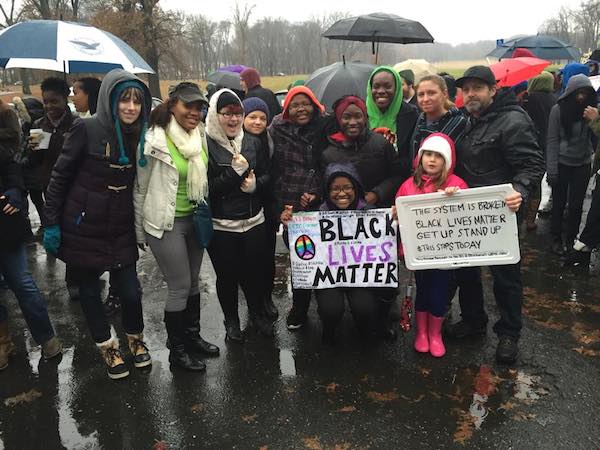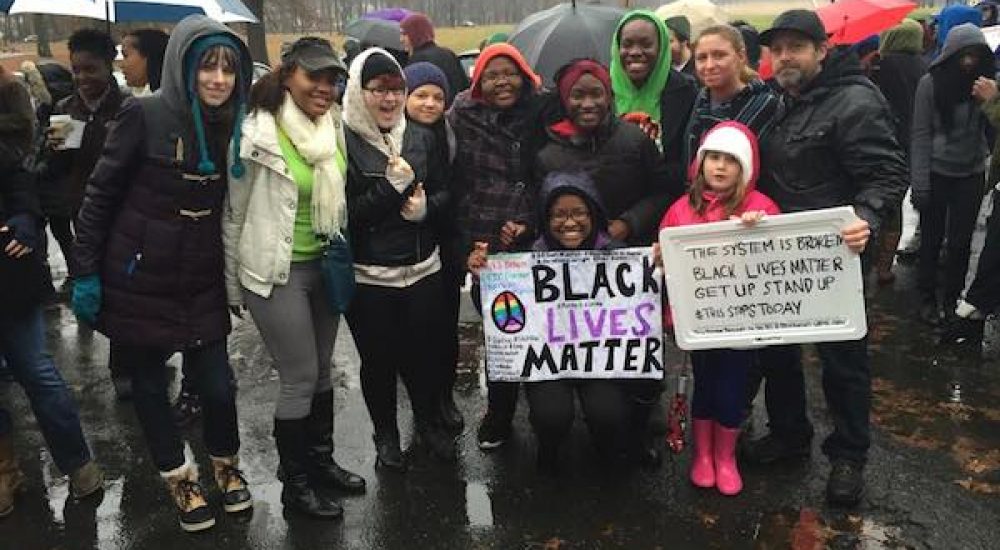2015! Wow! When I was a kid, in the 70’s and 80’s, we used to fantasize about what it would be like in the 2000’s.
There were going to be flying cars and moon shuttles for public use, machines on which you could dial up any type of food and it would instantly appear. Even sports would be different, played in mid-air with jet packs and in stadiums filled with interactive technology. All of these notions seemed so possible then, dreamed up by city kids who watched too many episodes of “Space 1999”, “Star Trek”, “Buck Rogers”, or even “The Jetsons”.
The future was still SO far away, or, at least it seemed so, because the past sure seemed to be. Here we were, a group of kids growing up together in Hartford, CT; white kids, black kids, Latino kids, all playing together and learning together. Reading and hearing about “the past”, and about how back then we wouldn’t be able to go to school together, or play together. We learned about Rosa Parks, Martin Luther King Jr., Malcolm X, and Bobby Kennedy. We learned about “Whites/Coloreds Only” and thought about how long ago that all seemed, even then, when it was only ten to twenty years prior.
And now, here we are in 2015! In the FUTURE!
And while we don’t seem to be any closer to flying cars or moon shuttles, we are still not far away from the very same issues that the aforementioned Civil Rights icons stood up against.
We have clearly made progress, but there is still, clearly, so much more to be made. Because of recent events surrounding decisions not to indict police officers for the killing of unarmed Black men, the topics of race, racism, and inequality have been launched back into the mainstream conversation as if propelled by the rocket fuel that was supposed to fly our cars. The “post-racial society” the pundits claimed our nation had evolved into, in light of the election of Barack Obama as the 44th President of the United States, seems to have been a pipedream, and it seems to me that we have reached another tipping point in the Civil Rights Movement and in our evolution as a “free” country for all people.
I am awed by the insight and compassion shown by the hordes of people who are outraged at the ongoing injustices and inequalities that plague black people and other “minority” groups in our country, and I am appalled at the outright racist and ignorant commentary of others who fail to see that so many of our fellow Americans are hurting and peacefully standing up for their rights to be treated fairly and as equal citizens. We are at another tipping point in terms of people revealing who we truly are.
As an educator, a parent, and a white man who was raised in the City of Hartford and had the opportunity to be a temporary minority and has made it a personal mission to break down barriers and to build bridges between people and communities, I am struck by the seeming silence of many of my fellow educators. Perhaps I am in a unique position in my role as an experiential and adventure educator, in that I have the benefit to be able to broach difficult conversations within the context of the groups I facilitate. Perhaps the topics of social justice and community are paramount in my work because I am an “expert” on “teamwork” and because people need to discuss how to work/get along well with others in my groups. However, I feel that I would be having these conversations with students regardless of the type of educator I am.
I am curious: how are people discussing these current events within their educational settings? ARE people?
One friend of mine, an amazing kid, now grown man, whom I grew up with, who is now a principal at an elementary school, and who attended a #BlackLivesMatter solidarity march with me here in Hartford. When I asked, “how are your teachers discussing these events in your school?”, he simply paused and replied, “They’re not. I’m not sure they know how.” And this is coming from a man who stands for equality and against injustice, a man who is outspoken about the social injustices in public education. We connected more about this later and I sent him some resources to share with his staff, but I was struck by it.

If people like my principal friend, who are comfortable being uncomfortable in having these, at times, very difficult dialogues about race and inequality, are having a difficult time approaching these conversations within the context of their “jobs” (Education), then how are the educators who don’t think about these topics consciously, or who hold the opposite opinions than mine discussing these events and the ripple effect that these events are having on our society?
Are we creating meaningful, engaging, and physically and emotionally safe learning environments in which to critically discuss these very human problems we are facing as a collective American culture?
As a facilitator of learning, I feel that using experiential activities that can bring up our commonalities and differences, all within the context of an activity, and this can be a great launch point for these types of important discussions. I have found that using activities that cause everyone to make assumptions about “an other” lend themselves to naturally segue into deeper discussions around privilege and race. I feel it is very important to regularly reflect on and continually re-examine our own implicit biases and to both recognize and unpack our own privilege, regardless of race, gender, class, etc… in order to be able to facilitate these conversations from a place of understanding, mindfulness, and compassion, and not just simply from a place of good intention.
I feel that as educators, we are bound by similar sets of rules and ethics (spoken and unspoken) and that it is our responsibility to be able to create these meaningful “important moments” within which ALL of our students can learn from and with one another. That it is our duty to create the space where students can make mistakes and still be able to remove their feet from their mouths when a cultural incompetence reveals itself without being painted as a “bad” person. Again, these are challenging conversations at times, particularly if we are not continually truly examining our own biases. However, I imagine those of us who are committed to the field of education understood the challenges we took on and that we are up to these challenges.
So, I challenge us. I challenge all of us as educators to facilitate these conversations and, at the very least, provide a space in which the students can share their thoughts and feelings about race, prejudice, poverty, and other social injustices, where students are listened to and validated, regardless if we agree with them or not. Mindful, compassionate dialogue is the only way we can begin to truly understand each other and the individual and collective challenges we face as fellow community members.
I challenge us, that if we are unable to feel comfortable enough being uncomfortable to do that, to, at the very least, invite someone who is adept at facilitating these types of dialogues to do so and then be open to participating mindfully in the discussions about these issues. I challenge us to open-mindedly examine our privilege and our implicit biases so that we can arrive at a place of compassion and understanding in order to be truly inclusive educators who are aware of the ways that many of the students who don’t look like us, or who come from similar backgrounds, are feeling.
I challenge us, as people in the world, to separate from our roles as educators, to realize our inextricable connectedness to everyone else on the planet in order to become the best me we can be. I am because you are. Ubuntu. (For those who have no idea what I am talking about or who think I am talking about the open source operating system, please see one of my earlier Breakfast Club Blogs about the philosophy “Ubuntu”!)
For breakfast this morning, I mused about this topic and reflected on our connectedness while munching on an organic multigrain English muffin with peanut butter and delicious homemade “Beach Plum Jelly” while sipping a cup of Jamaican Blue Mountain coffee.
Author Profile: @justinmcglamery
